- Home
- Deepak Chopra
Buddha Page 4
Buddha Read online
Page 4
“Stop!” Suddhodana’s patience had reached its limit. “If you think what I must do is too difficult, spare me your parables. Just tell me outright.”
“Make your son a total prisoner.”
The starkness of these words hit Suddhodana in his chest like a rock. Canki read his dismay and hurried on.
“This is a soul whose spiritual tendencies will be almost uncontrollable, and your only chance is when the boy is young. To make Siddhartha into a great king, never let him leave these walls,” the high Brahmin said. “He must believe this is a paradise. If he once sees suffering, your son will never obey you again. You’ll lose him forever.”
Suddhodana was stunned. “For how long must I do this?”
“Thirty-two years.”
“And there’s no other way?” The king had become extremely deliberate, as if weighing a death sentence. It revolted him to think that he had acquired a conspirator. Someone who had power over him from this day on. He felt smothered by the rage and helplessness whirling inside him.
Involuntarily his sword arm moved, and the next instant he had the Brahmin pinned to the floor with the edge of his blade. “You think you’ve achieved something today? Then remember the rest of Shiva’s story. Out of the sacred fire leaped a third monster, a hideous dwarf. Shiva pounced upon it and held its throat under his heels, crushing it. Who was that dwarf?”
“Ignorance.” Canki choked out the word.
“Don’t prey upon my ignorance, then. I know more than you suppose.” The king released the priest from underfoot. Suddhodana’s nature couldn’t be held in check. It was only tempered by this gnawing desire, only a day old but gripping at his spleen, to father the ruler of the world.
He departed with one last word for Canki. “Just be sure that you live long enough to see what I’ll do with you if this plan fails.”
Within the hour the king issued orders, dispersing his own people and banishing them from his city. His son would never be allowed to see suffering in any form—sickness, aging, or dying. Standing on the ramparts of the castle, he could see long trains of wagons leaving Kapilavastu. The rains had already come in torrents that washed away crops and flooded houses. Those least likely to survive were the old and sick. Lepers were hunched against the rain wrapped in dirty rags to cover their faces. Cripples who could not walk the roads were tossed wholesale into supply wagons from the army, with soldiers ordered to drive them far away and dump them in remote villages. The oldest were sole survivors, and these were thrown into separate army wagons. They were told that homes awaited them in a better place, a cruel way of hinting at the reality—they would be abandoned in the forest a day away.
Only the nobles were exempted, and those under strict conditions. Venerable figures like the astrologers were sworn never to be seen by Siddhartha at any time, under pain of banishment. Others not yet old could remain at home, but if they grew ill or aged, they would be confined under house arrest. All funerals would take place at night, without public ceremony. The burning ghats were moved two miles downriver. Suddhodana knew how to organize a battle campaign, and the first rule is that victory is more important than the costs it entails. This campaign would be no different.
Ruler of the four corners of the earth. He had memorized the words in the chart. How would that feel? he wondered. After three days the great wooden gates of Kapilavastu closed; the bitter cries of those who had to leave and those who had to let them go were silenced. The job was complete.
THREE WOMEN CHASED a small boy across the park. They ran over lawns kept immaculate by slaves on their knees with clippers, through gardens filled with flowering jasmine whose fallen blossoms were swept from the path every morning. It wasn’t a serious chase, but the boy, Siddhartha, pretended it was. When he sped up or took a sudden zigzag, his pursuers did too. But you didn’t have to be seven years old to notice that they never caught him.
Not only that, but the three women always ran in the same order. First came Prajapati in her gold-embroidered sari the color of peacock blue, although on other days it could be vermilion or emerald. Prajapati was the prince’s aunt, sister to his dead mother. Suddhodana had formally given her the status of a wife, but the two had no conjugal relations. The king was paying honor to her and acknowledging her role as stepmother to the prince.
The heavy gold bangles in her ears tinkled softly as Prajapati ran. Behind her came two peasant girls, considerably younger and slimmer than Siddhartha’s aunt. They wore coarse cotton saris with no embroidery, their ears had small silver bangles in them, and they slowed down enough so that Prajapati was always first.
“Channa, Channa!” The boy called out his friend’s name.
On days like today, when the sun was out and the morning air was cool, the world his father had built for him was big enough, and he didn’t wonder what lay beyond the high walls surrounding the palace grounds.
“Prince, stop!” cried one of the aunties.
“Oh, Prince, do come back!” another begged.
Siddhartha veered toward the stables. He wasn’t running away from the women for recreation. He had made a discovery that he wanted to show Channa. As long as he was supervised, the king allowed him this freedom. The stables were much better for a boy than a palace, anyway, and once he crossed the threshold, Siddhartha’s aunties always stopped short. Prajapati had never set foot in a stable, and although the peasant girls certainly had, their newfound station as royal servants prevented them from entering a precinct where only males belonged.
Hearing his name, Channa appeared at the stable door. He jumped and waved his fists, encouraging Siddhartha on. If it had been him racing the prince, he would have won easily, being taller and stronger despite the fact that they were born the same week.
Siddhartha dashed inside. “Hide!” he cried.
There was no need for him to be hidden from anybody. The rules of the chase were well known to all, but Channa grabbed Siddhartha by the arm and pulled him inside, as if hauling a fellow soldier to safety inside an armed fortress. The two boys raced past the stalls where warhorses were kept when in heat or giving birth to spring foals. Their heels kicked up clouds of dried dung that the sun turned into glowing auras around them.
“Here!” Channa led the way to a feed bin. It smelled of fresh hay with a sour undertone of rotted hay beneath. This was a favorite retreat since they could burrow as deep into the hay as they wanted to escape detection. Siddhartha perched on top of a nearby bale and reached into his pants. He pulled out a tiny creature.
Channa’s face fell. “It’s just an ant,” he said, disappointed.
“No, it isn’t. Look closer.”
The feed bin was dim, but now Channa saw that the insect, a large black soldier ant common around the stables, was still clutching its prey, a dead termite, in its jaws. The termite, which wore stiff papery wings, was newly hatched and twice as large as the ant.
“Where did you find it?” asked Channa, still unimpressed. But he saw that Siddhartha was excited.
“By the water fort.” This referred to one of the floating pavilions on the shore of a lotus pond in the park. “I saw the whole battle.”
The event had taken place that morning when Prajapati found Siddhartha wandering away from the palace. He was sitting on the ground beside the pavilion staring intently at the dirt. A string of black soldier ants was clashing with sentry termites at the entrance of a small colony.
Prajapati stopped a few feet away. “Who’s winning?” she asked.
“That doesn’t matter. It’s something else.”
Siddhartha was staring at a particular soldier ant carrying a dead termite in its jaws. The ant had reached an obstacle in its path, a large pebble. The pebble was five times the ant’s size, and it was already carrying a load twice its weight. For half a second the ant paused, then it started to climb up the pebble. The way was too steep and it fell back, but this was no deterrent. The ant climbed up again, fell back again, climbed up a third time.
&nb
sp; “How foolish! It should just go around,” Prajapati said.
Siddhartha shook his head. “The mighty don’t go around.”
“Is an ant so mighty?”
The boy ignored her amused tone. “He thinks he is. That’s what counts.”
“I could step on him. Then how mighty would he be?”
At that moment the boy said something quite surprising. “God could step on my father, but he still thinks he’s mighty.”
Prajapati was nonplussed. “It’s not the same thing.”
“Why not?”
Siddhartha glanced at her with his wide brown eyes, eyes that had seemed twice the normal size when he was an infant. But before his aunt could reply, he returned to the ant, scooping it up in his hand. His whole attention was focused on it. “If you think you’re mighty, that’s all that counts. No one is really mighty.”
What a strange child you are, Prajapati thought, but she hid this from Siddhartha, saying, “I never thought of it that way.”
“What do you think?” he now asked Channa, having told him everything.
Without a word his friend shot his hand forward and pinched the black ant in half between two fingers. “I think we need to find a better game. That one’s no good.”
He shoved Siddhartha into the hay, and when the prince came up sputtering stalks of long grass, he shoved back. The boys’ tussle was interrupted. “Channa!” The boys looked up as if on command from the god of the stables.
Bikram appeared at the gate of the feed bin, his bulk almost filling it. He wore a thick leather apron and metal-fitted leggings, as he always did in mating season when a stallion could unexpectedly lash out with its hooves.
Stooping, Bikram picked up a clod of horse manure and flung it at the two peasant girls lingering at the stable door. Prajapati had left them to wait until Siddhartha emerged again. The girls squealed as the clod barely missed them; they had already started backing away. Siddhartha and Channa crowed in triumph.
Bikram wasn’t smiling. “I need you, boy.”
Channa ran after his father, who was the king’s stablemaster when there was no battle to fight. Not that there had been many since the birth of the prince. The kingdoms of Kosala and Magadha to the east had made peace with Suddhodana, and he had relinquished his need for raiding frontier villages to add to his domain.
Although he was less than half the size of his broad, beefy father, Channa’s frame promised that same height and bulk one day. He could hear commotion from a far stall that was different from horses in heat. Bikram noticed that Siddhartha was trailing behind them. “Not you, young prince,” he said. “Just the boy.”
Siddhartha stopped short, confused. “Why not?”
“Because your father would have my hide. This isn’t for your eyes. Stay put until me and the boy come back for you.” Bikram wasn’t stern with the seven-year-old, who was never addressed as “boy.” He just made clear what was needed. Siddhartha obeyed automatically.
He hung back as Channa and his father rounded the corner and entered an open stall. The gate shut behind them. Siddhartha squatted in the straw-covered dirt. His eyes roamed over the array of saddles and bridles hanging on the wall; he caught the clinking of hammers on the smithy’s forge out back. Listening intently, he thought he heard Bikram’s muttered voice, then Channa’s.
The boy was uneasy being left alone. He had a secret. Not the kind he was ashamed to reveal so much as one he couldn’t fathom. To escape thinking about it, he gazed up at the stable roof. It was old, and the timbers had warped over the winter, letting in the rain and beams of bright sunlight when the weather was clear.
His eyes caught a sunbeam now, and he watched motes of dust dance in it.
Look closer.
Siddhartha shivered and tried not to listen. The words in his head didn’t feel like his own. They came unlike ordinary thoughts. The voice had begun about a week earlier—this was his secret—and almost always said the same thing. Look closer.
The sunbeam fell warmly across his eyelids, and he felt dreamy. The dust motes seemed to seize his attention and grow bigger.
What if we are made of dust? All things that come from the earth are only dust.
Siddhartha looked down at his arm and brushed away the film of dried dung that had settled on it. More dust flew up into the sunlight.
I am just dust, he thought.
He jumped to his feet and began to run.
Only dust.
The voice had turned on him, was suddenly harsh and mocking. Siddhartha didn’t want to hear it anymore, and it was all the boy could do not to cry. He raced toward the stall where Channa had gone. He paused at the gate, not wanting to be seen this way, weak and shaken. Above him, in the shadowy rafters, an unseen figure sat. Eyes watched the boy trying to calm down, and a calculating mind considered its next move.
Siddhartha pushed at the gate, but it was locked from the inside.
On the other side Bikram’s voice was sharp. “Hold her down, I said.”
Siddhartha heard a horse whinnying in pain and hooves clomping against the ground. He peered through a crack in the gate. A sick old mare was lying on her side, heaving and quivering. At one end crouched Channa, trying his best to hold the mare’s head still. At the other end Bikram was tying her hind legs together with rope; he had already tied the front legs, and they clomped helplessly against the ground. Bikram stood up. Siddhartha saw the grimness in his face and the fear in Channa’s.
“It’s going to be all right,” the boy whispered into the mare’s ear, which twitched as if hearing a nearby predator. Eyes rolling wide and white with terror, the horse sensed what was coming.
“I need you to be strong,” said Bikram. “You know why the prince couldn’t be here for this?”
“No.”
His father shrugged. “No need. Just remember, he can’t be here, understand?” Channa nodded. “Once everyone’s asleep tonight, we’ll take her outside the gates and bury her. He doesn’t ever need to know she’s dead.” Channa nodded again.
Above Siddhartha, an unseen figure—Mara himself—peered down, considering his next move. He had waited a long time to rejoin the boy and draw him closer. Close enough to become a voice in his head. The demon clapped his hands, wondering if the boy might look up, but Siddhartha’s eyes were fixed on the scene in the stall. Bikram picked up a heavy ax and turned the blunt side of the blade outward, like a club. He walked slowly to the mare’s head.
“Look away, boy.”
Channa did as he was told; his father raised the ax high in the air, brawny knots standing out from his bare arm. Out of the corner of his eye Channa saw him bring the ax down; there was a loud thud and the crunch of bone, but in the instant before, as if sensing its fate supernaturally, the old mare screamed.
Siddhartha heard it as he ran, a piercing pitiful cry that made the other horses shiver in their stalls. He was terrified, but he hadn’t witnessed the blow. Something pulled the boy away at the last second—weakness, or a better impulse?—saving him from the grisly sight. Panicked, he ran outside, putting as much distance between himself and the stables as he could. Prajapati’s two young servants saw him and gave chase.
Mara knew the moment was ripe. He was suddenly beside Siddhartha, arms and knees pumping as he matched him stride for stride.
“Yah!” the demon shrilled. “Giddyap! Let’s see you run!”
Siddhartha turned his head, and his eyes widened. It was only a quick, panicky glance, but Mara was certain he’d been seen. It was the first time, a milestone.
Turning his gaze from the horrible sight, Siddhartha focused on the palace ahead of him. The building was huge and ornate, a thing of beauty according to every visitor the young prince had held audience with. He ran through an arched doorway, not slowing at all. Soon he reached the closed door of his father’s bedroom. No one had followed him, and gradually his breath stopped burning in his chest. Cautiously, hearing the murmur of voices from within, Siddhartha tried the lock. It
was open. Moving with the natural stealth of a child, he pulled the door open and peered inside.
His father’s private chambers were vast and ornate. The best silks and the finest gold made up the bedding and decorated the furniture. Polished floors gleamed with candlelight, and a small group of men huddled around his father’s bed.
Suddhodana sat propped up by pillows. The men around him were court physicians, who poked and prodded, examining their royal charge gingerly.
“Get on with it,” he grumbled. “If you’re here to get me closer to dying, don’t bother. Time is taking care of that.”
Siddhartha drew back. He had never known his father to be sick, barely recognized these men as doctors. They had rarely appeared in his short life, and only before dawn. The king didn’t want his son to be awake when he needed tending. But Siddhartha could vaguely remember, as if seeing through a fevered haze, the same poking and prodding he now observed.
One of the physicians gestured to another, who held a large wooden bucket with a lid. Removing it, the second physician reached inside and withdrew a large, fat leech.
“Lie back, Your Majesty. This will be the last time, I promise.” The lead physician was a thick man with gentle hands. He was called Gandhik, Siddhartha remembered. Taking the leech, Gandhik applied it directly over his father’s heart. It was all Siddhartha could do to remain silent when he saw the six leeches already feeding on his chest. Swollen and dark, they looked like they were trying to crawl inside him.
“Disgusting,” the king snapped. “You and your so-called arts.” He heaved a sigh of resignation. “Disgusting.”
“Hold still, Your Majesty,” Gandhik directed in a quiet, patient tone.
“I want to be strong again,” Suddhodana said. Then he shook his head. “Who am I fooling? I want to be young again.”
Lying there on the pillows, his graying hair feathered out around him, the king permitted the indignities of medicine as a distraction—they kept him from dealing with the passage of time. Every day seemed to be a weight around his neck, depriving him of another ounce of strength.

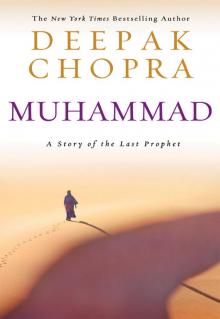 Muhammad: A Story of the Last Prophet
Muhammad: A Story of the Last Prophet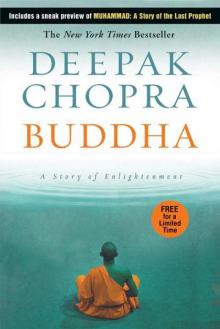 Buddha
Buddha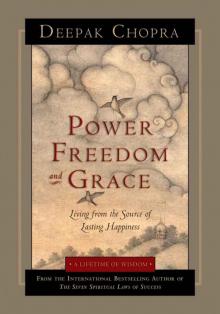 Power, Freedom, and Grace
Power, Freedom, and Grace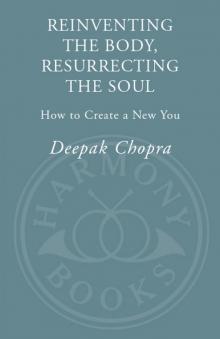 Reinventing the Body, Resurrecting the Soul: How to Create a New You
Reinventing the Body, Resurrecting the Soul: How to Create a New You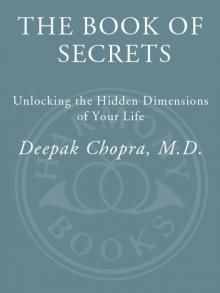 The Book of Secrets: Unlocking the Hidden Dimensions of Your Life
The Book of Secrets: Unlocking the Hidden Dimensions of Your Life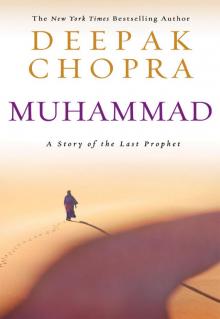 Muhammad
Muhammad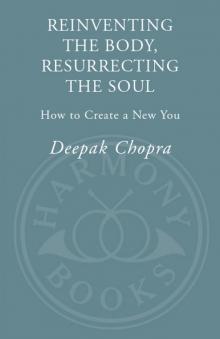 Reinventing the Body, Resurrecting the Soul
Reinventing the Body, Resurrecting the Soul